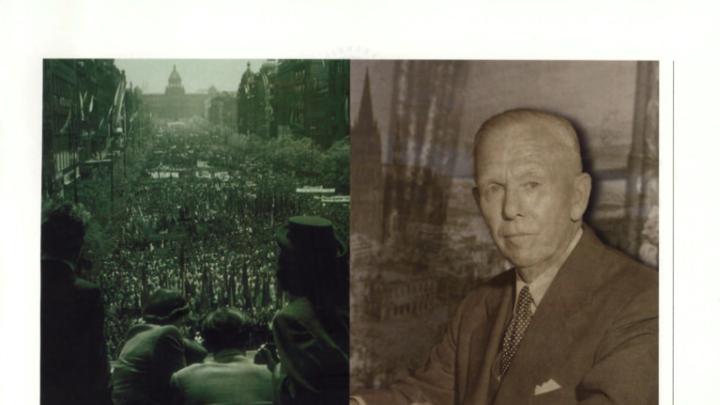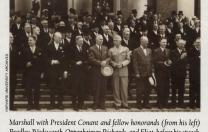Seventy Commencements ago, in the wake of World War II, the United States embraced both its role as leader of, and forceful engagement with, the world. The most important expression of that perspective, an announcement of lasting historical importance, was the Marshall Plan: the commitment to support and reconstruct Europe. It was enunciated by then Secretary of State George C. Marshall, who was an honorand on June 5, 1947. In 1997, Harvard Magazine editor emeritus John T. Bethell detailed how the event came about and what it meant. At the current moment, two decades later, it seems especially important to revisit his account of that time and the policy it created, and so we republish the article now.
~ The Editors
Harvard’s “Victory Commencement” of 1946 was an expression of pride in the accomplishments of the American military in World War II. Honorary doctorates had been voted to six top-ranking military leaders, including Generals Dwight D. Eisenhower, Douglas MacArthur, and George C. Marshall. MacArthur and Marshall were unable to come to Cambridge to claim their degrees. But as President Harry S. Truman’s newly appointed secretary of state, Marshall was one of 12 honorands at the following year’s Commencement. On the morning of June 5, 1947, President James B. Conant cited him as “An American to whom Freedom owes an enduring debt of gratitude, a soldier and statesman whose ability and character brook only one comparison in the history of this nation.” The former general of the army was also one of a half dozen speakers at the annual meeting of the Harvard Alumni Association that afternoon.
Marshall used the occasion to propose a program of massive economic aid to war-ravaged European nations. His 1,200-word speech took less than 12 minutes. Though few sensed it at the time, it would go down as the most important Commencement address ever given at Harvard.
From a literary standpoint the speech was unexceptional. It read like a factual memorandum, and Marshall’s oratorical style was uninspired. Firsthand accounts portrayed a self-effacing orator who toyed with his glasses, kept his eyes on his text, and was sometimes inaudible. But some of the greatness of Marshall’s address lay in its absence of rhetoric and its modesty of expression. It was a straightforward argument for the provision of generous assistance to America’s global neighbors in Europe, conditional only on their willingness to cooperate in charting their own economic recovery.
That the speech was given at Harvard was almost a matter of chance. Marshall was also invited to speak at the University of Wisconsin and at Amherst that spring.
Harvard had sought to honor him with a degree in 1945 as well as in 1946. Early in 1947 President Conant renewed the offer. Marshall asked if he might defer his response. He had just been named Secretary of State and was about to attend a foreign ministers’ conference in Moscow, where the reconstitution of Germany would be the principal issue. During the month-long conference he met privately with Joseph Stalin. The Soviet premier’s intransigence heightened Marshall’s anxiety about the future of Western Europe. “The patient is sinking while the doctors deliberate,” he declared on returning from the failed conference.
In the weeks that followed, Marshall oversaw the development of a proposal for unilateral aid to Europe—informally known within the State Department and the White House as the Marshall Plan. In early May, Under Secretary of State Dean Acheson floated the idea of large-scale assistance to Europe in a speech to the Delta Council, an association of businessmen, farmers, and civic leaders in Cleveland, Mississippi. When Acheson suggested that the time might be ripe for the secretary himself to come out for the plan, Marshall asked if Harvard’s Commencement would provide an appropriate forum. Acheson later recalled that he had advised against it, “on the ground that commencement speeches were a ritual to be endured without hearing” but Marshall did not dismiss the idea. He asked his special adviser, Charles E. Bohlen ’27, to work up a draft based on memoranda from Under Secretary Will Clayton and George F. Kennan, chief of policy planning. Acheson read it and added comments, but wrote later that he had “heard no more.” Apparently President Truman—who had left Washington to be with his dying mother in Kansas City—never saw a draft of the speech.
Laird Bell ’04, a Chicago lawyer, was then president of the Harvard Alumni Association. Among his responsibilities was the selection of Commencement speakers. Bell had assigned one of the afternoon’s two principal speeches to his friend Ernest Colwell, president of the University of Chicago. At the urging of President Conant, who wanted a military figure, Bell had somewhat reluctantly turned to General Omar Bradley, administrator of veterans’ affairs, as his second major speaker. With Commencement only a week away, the State Department advised Bell that Secretary Marshall would be willing to make a brief address at Harvard, though he did not wish to be the main speaker. “Thus I wound up with two generals instead of none,” Bell said later. “I did not realize how historic the occasion would be.”
It would have been memorable in any event. An audience of about 7,000 joined the degree candidates and faculty members in the Tercentenary Theatre. President Conant awarded 2,185 degrees in course, a dramatic increase over the 583 awarded at the 1946 exercises. (One of those degrees was the hundred-thousandth conferred by Harvard since 1642). Among Marshall’s fellow honorands were J. Robert Oppenheimer ’26; T. S. Eliot ’10; University Professor I. A. Richards, exponent of Basic English; W. A. Dwiggins, typographic designer; William F. Gibbs, a naval architect largely responsible for the mass production of ships; and Marshall’s old friend James Wadsworth, a former New York senator and longstanding advocate of military preparedness. Marshall’s LL.D. was the last one conferred.
At the afternoon meeting, Marshall followed Laird Bell, Massachusetts governor Robert Bradford ’23, LL.B. ’26, General Bradley, President Colwell, and Professor Richards. His first words struck a note of humility that informed his entire speech: “I am profoundly grateful—touched by the great distinction and honor and great compliment accorded me by the authorities of Harvard this morning. I am overwhelmed, as a matter of fact. And I am rather fearful of my inability to maintain such a high rating as you’ve been generous enough to accord to me. These historic and lovely surroundings, this perfect day, and this very wonderful assembly—it is a tremendously impressive thing to an individual in my position.”
Marshall then began his prepared speech: “I need not tell you that the situation in Europe is very serious.” The damage to Europe’s economy was far worse than anyone had foreseen. “It is logical,” declared Marshall, “that the United States should do whatever it is able to do to assist in the return of normal economic health in the world, without which there can be no political stability and no assured peace.”
The speech was short on specifics. The president’s enunciation of the Truman Doctrine in March had taken Congress by surprise, and powerful senators had resented it. Marshall and his advisers undoubtedly thought that unfolding a detailed plan would be counterproductive. Marshall said nothing about the amount or duration of U.S. aid, referring only to “substantial additional help.” He spoke of “our policy,” but did not put a name to it. (The Harvard Alumni Bulletin headed the text of his untitled speech “The Marshall Doctrine.”) Though the speech was clearly meant as a firm initiative, its language at one point suggested otherwise: “It would be neither fitting nor efficacious for our Government to draw up unilaterally a program designed to place Europe on its feet economically....The initiative, I think, must come from Europe.” And though the plan seemed likely to help block the extension of Soviet influence, the threat of Communism was never cited. Marshall spoke only of “disturbances arising as a result of the desperation of the people concerned.”
Marshall had added two handwritten paragraphs at the end of the speech, reiterating concerns he had voiced at the start. “It is virtually impossible at this distance merely by reading or listening, or seeing photographs and motion pictures, to grasp at all the real significance of the situation,” he declared. “And yet the whole world of the future hangs on a proper judgment.” When Marshall finished, Laird Bell wrote later, “the applause was tremendous.”
But few grasped the historic dimensions of Marshall’s words. Press-relations officers at the University and the State Department advised reporters that the address was “a routine commencement speech” (see related story). A headline in the next day’s New York Times read, “Marshall Pleads for European Unity.” Years later, President Conant would state in his memoirs that he had not understood the import of the speech.
But its point was not lost in Europe. British Foreign Secretary Ernest Bevin heard portions of Marshall’s speech on that night’s BBC news. The next day he phoned French foreign minister Georges Bidault. Their governments quickly affirmed that they would accept Marshall’s overture.
“When the Marshall proposals were announced,” Bevin later recalled, “I grabbed them with both hands.” Over the next fortnight Bevin and Bidault organized a unified European response. “I can only say to other nations,” declared Bevin, “that when the United States throws a bridge to link the East and the West it is disastrous for ideological or other reasons to frustrate the United States in that great endeavor.”
Officials from 16 European nations met in Paris in July to outline a joint recovery plan, thus meeting Marshall’s politically saleable stricture that the initiative must come from Europe. Despite Bevin’s injunction, Soviet Russia and nations under Communist control declined to participate in the talks.
The plan took shape slowly. In midsummer, Washington wags were comparing the Marshall Plan to “a flying saucer—nobody knows what it looks like, how big it is, what direction it is moving, or whether it really exists.”
In December President Truman submitted the first official version of the Marshall Plan—officially, the European Recovery Plan—to Congress. On April 3, 1948, one year after the failed Moscow conference, Truman signed the Foreign Assistance Act, authorizing grants and loans amounting to $17 billion over the next four years. In that period, the participating nations—those under Russian control had refused to take part—restored their industrial and agricultural production, stabilized their currencies, and registered increases in gross national product ranging from 15 to 25 percent. But the benefits of the Marshall Plan transcended economics. “All free peoples are at last discovering a firm, sound basis for united action,” said Paul Hoffman, the Marshall Plan’s chief administrator, when Harvard gave him an LL.D. at the Commencement of 1948. To Winston Churchill, the plan was the “most unsordid act in history.” Speaking at Harvard 20 years later, Prince Bernhard of the Netherlands described the plan as “an act without peer.” Never before, he said, “has a strong power made it a central objective of foreign policy to create another strong power. Never in history has there been such a striking contrast with the foreign policy of major power, contained in the classical maxim of divide et impera.”
In later years, Marshall’s address would seem even more remarkable. The policy it bespoke was a superior example of enlightened self-interest. Both speech and policy presented the United States and its citizens in the best possible light—in a phrase that W. H. Auden had minted, “a friend to the future.”









